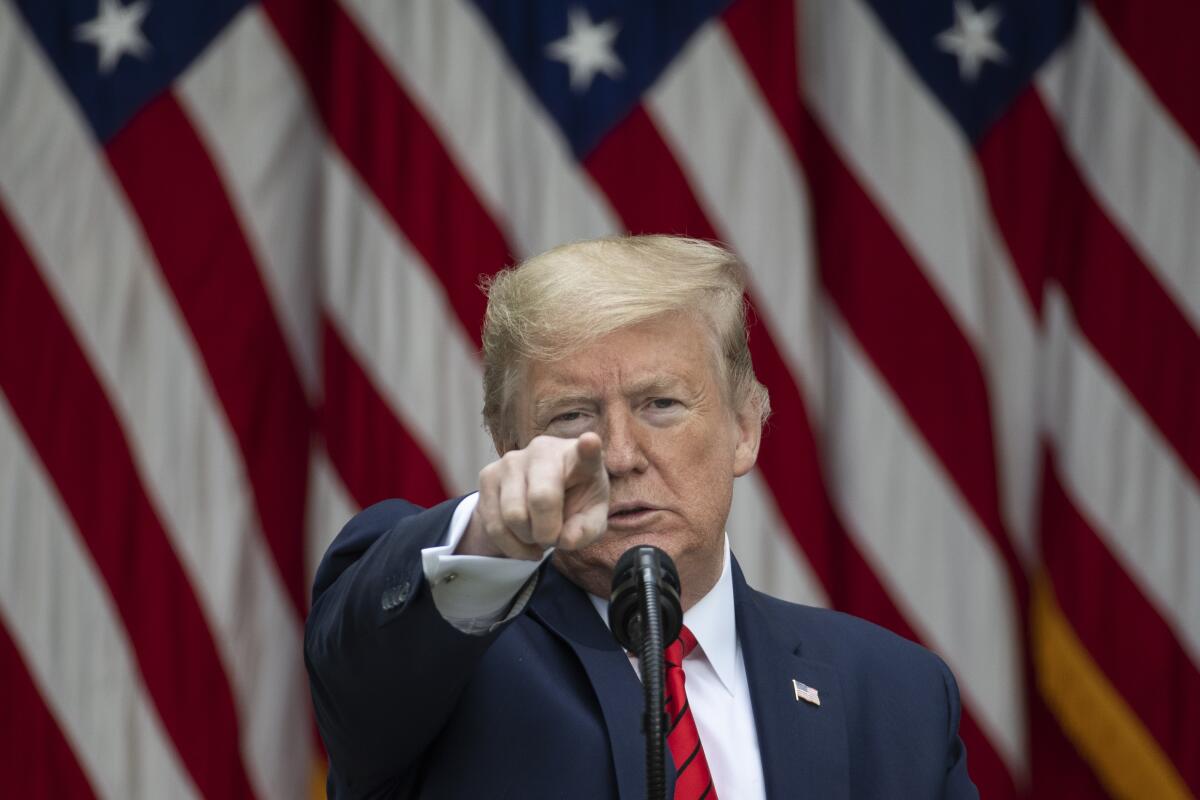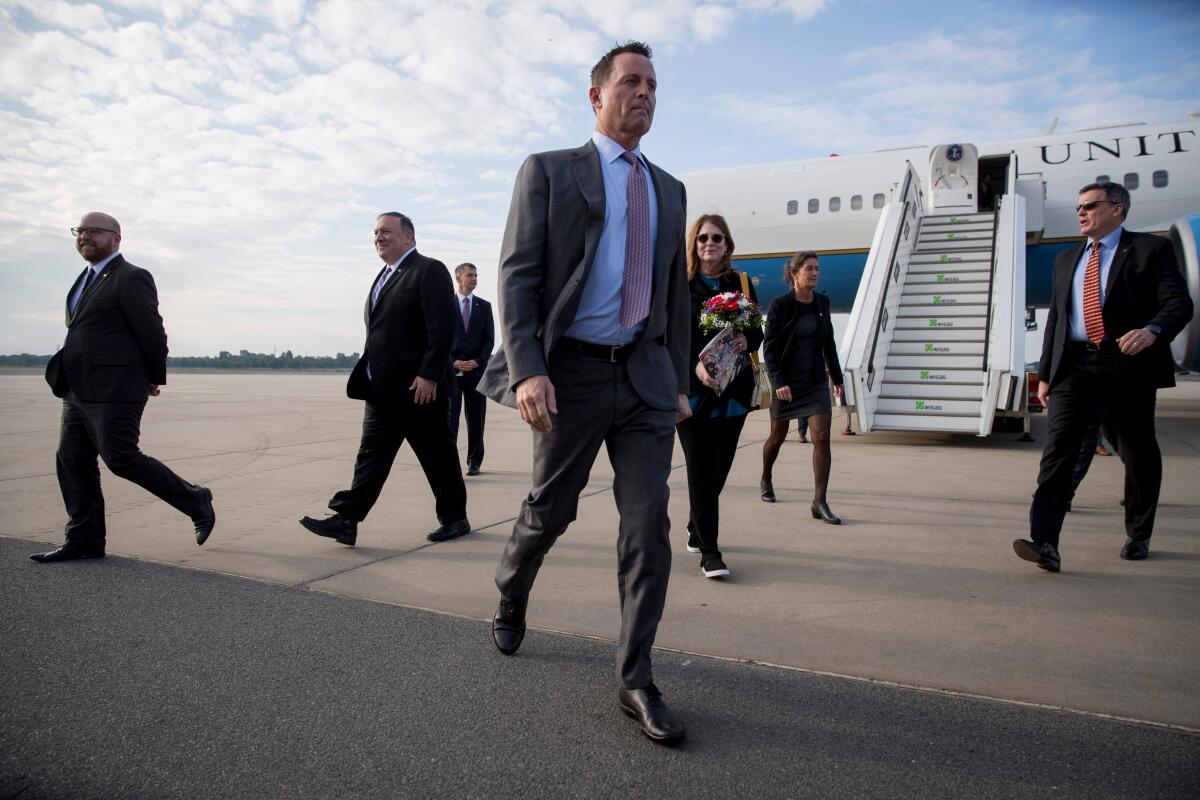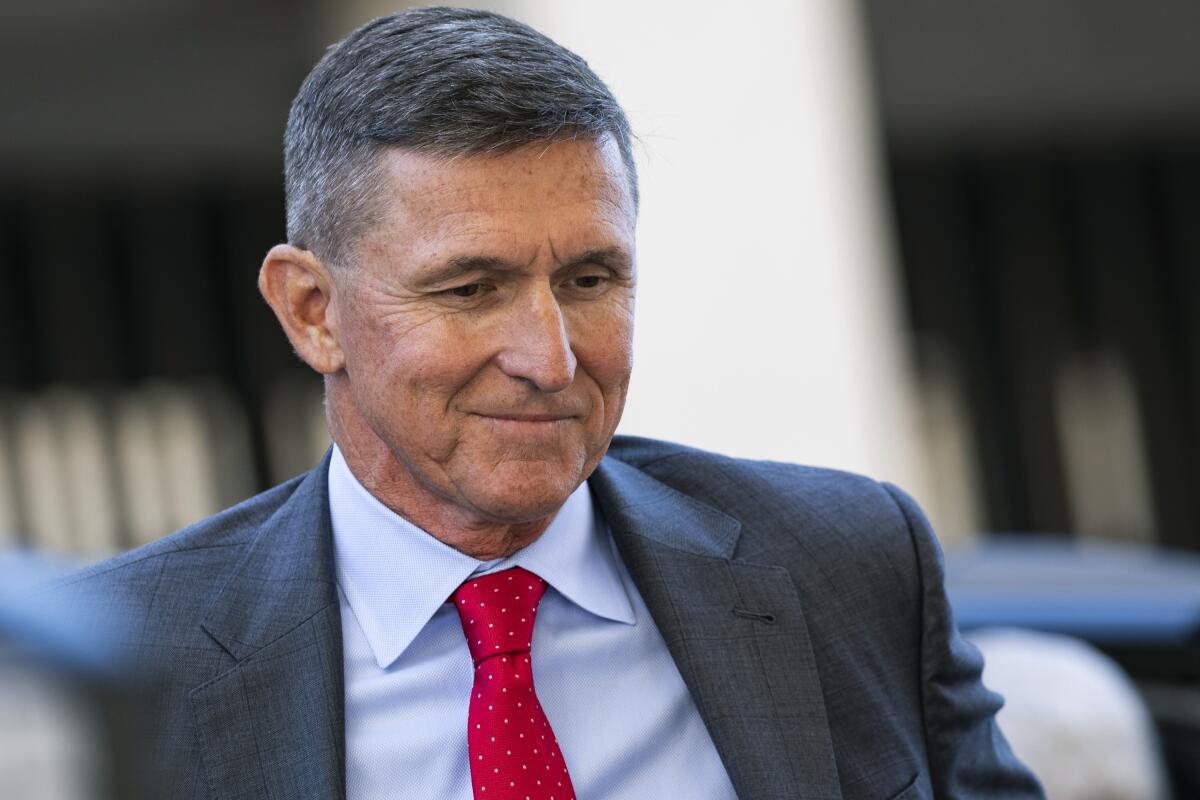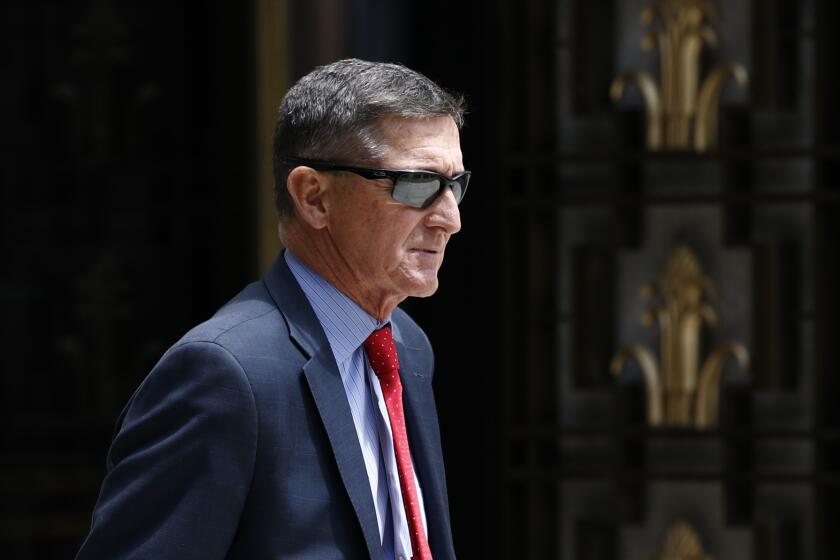Trump’s allies claim to see Biden’s hand in Flynn case

WASHINGTON — President Trump’s efforts to use the now-closed Russia inquiry as a campaign issue got a potential boost Wednesday with the release of a declassified document tangentially tying Joe Biden, his likely Democratic opponent, to the investigation of Michael Flynn, Trump’s first national security advisor.
It showed that Biden, then the vice president, was among dozens of senior Obama administration officials who may have learned of Flynn’s phone conversations with the Russian ambassador, who was under routine surveillance by U.S. intelligence agencies, after Trump’s election but before he took office.
The identity of U.S. persons caught up in foreign intelligence intercepts normally is concealed, but they can identified through a process known as unmasking.
The declassified document does not show that Biden did anything improper, and it says the unmasking request was approved under normal procedures at the National Security Agency.
Flynn later pleaded guilty to lying to federal agents about whether he had talked with the Russian ambassador about U.S. sanctions on Moscow and an upcoming United Nations vote.
Trump’s first national security advisor, Michael Flynn, pleaded guilty in December 2017 to lying to the FBI in the Russia investigation. But now he insists his case should be thrown out and the alleged injustice has become a rallying cry for Trump supporters.
During a meeting at the White House with two governors on Wednesday, Trump called Biden “a big unmasker” who was more involved with the Flynn case than he claimed.
“The unmasking is a massive thing,” Trump said. “I just got a list. Who can believe a thing like this?”
Biden’s campaign called the release an attempt to distract from Trump’s mishandling of the coronavirus crisis and a “gross politicization of the intelligence process.”
“These documents simply indicate the breadth and depth of concern across American government — including among career officials — over intelligence reports of Michael Flynn’s attempts to undermine ongoing American national security policy through discussions with Russian officials or other foreign representatives,” said Andrew Bates, a campaign spokesman.
Sens. Ron Johnson (R-Wisc.) and Charles E. Grassley (R-Iowa) released the declassified document after it was provided by Richard Grenell, Trump’s acting national intelligence director. Grenell’s declassification of the document added to concerns that Trump was harnessing his national security agencies to supply him with political fodder.

It comes a week after Atty. Gen. William Barr took the extraordinary step of asking U.S. District Judge Emmet Sullivan to drop the criminal case against Flynn, saying the FBI did not have a valid reason to investigate him despite his subsequent guilty plea in court.
On Wednesday, Sullivan made it clear he was not convinced. He appointed a retired judge to present arguments opposing the Justice Department’s motion and to recommend whether Flynn should face criminal contempt for perjury — presumably for lying in court about whether he was guilty of lying to federal agents.
Barr’s move to drop charges against Flynn sparked criticism that he had bowed to political pressure and undermined the credibility of the Justice Department, which the attorney general denied. But the president, who has tried to undo the work of former special counsel Robert S. Mueller III, praised Barr for seeking to exonerate Flynn.
Biden was one of dozens of senior officials — including John Brennan, the CIA director; Samantha Power, the U.S. ambassador to the U.N.; and Denis McDonough, Obama’s chief of staff — who may have received intelligence reports including Flynn’s name after it was “unmasked,” according to the new document.
“Unmasking is common — literally hundreds of times a year across multiple administrations,” said Michael Morell, who served as acting CIA director under President Obama. “In general, senior officials make the requests when necessary to understand the underlying intelligence.”
Susan Rice, Obama’s national security advisor, was not named in the document. But during a closed-door interview with the House Intelligence Committee on Sept. 8, 2017, she explained why unmasking would have been used in such a situation, saying she would be concerned if people were trying to undermine U.S. foreign policy during a presidential transition.
“We had, to be very honest, ample reason for concern about that,” Rice said.

Trump has sought to portray Flynn — and himself — as victims of a “deep state” conspiracy involving a tangled cast of perceived enemies from the Obama administration. He has recently begun calling the alleged plot “Obamagate,” and campaign officials celebrated release of the declassified document on Wednesday.
“Americans have a right to know the depth of Biden’s involvement in the setup of Gen. Flynn to further the Russia collusion hoax,” said Brad Parscale, Trump’s campaign manager.
Although Mueller wrapped up his investigation in March last year, Trump remains intently focused on it. During a White House meeting with Republican lawmakers on Friday, purportedly to discuss the COVID-19 pandemic, Trump detoured to talk about the inquiry.
“Mueller’s gang didn’t find that I did much, did they?” he said.
Barr has played a leading role in rolling back aspects of the Mueller investigation, which focused on Moscow’s meddling in the 2016 election.
Mueller ultimately charged 34 people during his two-year investigation, but no one on Trump’s campaign was charged with conspiring with the Russian operation. Flynn was the only member of the White House to face charges.
Two years after pleading guilty, Flynn asked to withdraw his plea by claiming he was poorly served by his original legal team and was a victim of prosecutorial misconduct. In February, Barr appointed Jeffrey Jensen, the U.S. attorney in St. Louis, to review the case against Flynn, leading to the request for dismissal.
Barr also assigned John Durham, the U.S. attorney in Connecticut, to conduct a broader inquiry into Mueller’s work. Durham is looking into the intelligence that was used to launch the Russia investigation, as well as how the inquiry was conducted.
It’s unclear whether Trump’s focus on the Russia investigation will benefit his reelection campaign. His festering anger has backfired in the past.
The most notable example came on July 25, when he asked Ukrainian President Volodymyr Zelensky to help him investigate Biden and a conspiracy theory involving the origins of the Russia investigation.
The conversation became the basis for Trump’s impeachment in December by the Democratic-led House of Representatives, the third president in history to face that ignominy. Like his predecessors, Trump was later acquitted by the Senate.
More to Read
Get the L.A. Times Politics newsletter
Deeply reported insights into legislation, politics and policy from Sacramento, Washington and beyond. In your inbox three times per week.
You may occasionally receive promotional content from the Los Angeles Times.











